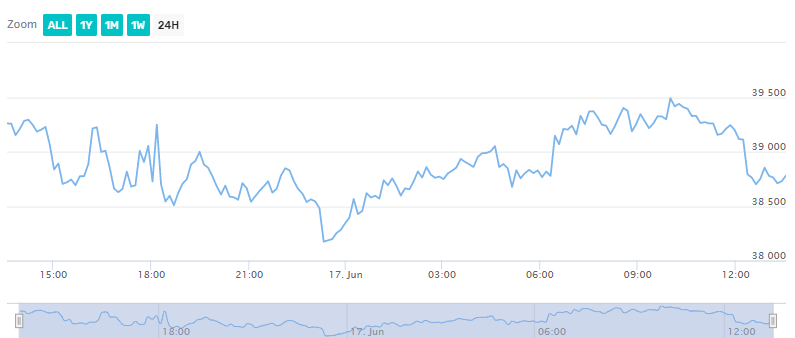17 Jun 2021 Jane Whitmoore
Bitcoin Price Falls After The Federal Reserve Announced Plans To Increase Interest Rates
Bitcoin, the world’s largest cryptocurrency to date, failed to hold the key psychological support zone of $40,000 as both the Dow and the S&P 500 indices pulled back 0.77% and 0.54% respectively, due to the Federal Reserve announcing its plan for two interest rate increases in 2023.
Source: CryptoBrowser
Bitcoin’s Federal Reserve Chair Jerome Powell announced that the Fed plans to push forward its timeline and make two interest rate hikes, which made Bitcoin’s price tumble below $40,000.
Powell explained that the Fed had raised its inflation expectation from 2.4% to 3.4%, which coincides with economists’ worries about rising inflation in the United States. However, despite Powell describing the inflation spike as “transitory”, consumer prices reached a 13-year high. Analysts raised concerns that the rising inflation will greatly slow down the post-COVID economic recovery.
Also, Powell didn’t uncover whether, or when, the Fed would begin altering its $120 billion monthly bond purchase policy. The interest rate hikes, however, suggest that the Federal Reserve would cut its bond purchases ahead of the interest rate increases in order to make the hikes more tolerable.
The price of the largest crypto to date already showed signs of weakness, as it fell back to an intra-day low at $38,300. In contrast, technical analysts note that Bitcoin’s price successfully completed its bullish inverse head and shoulders pattern, but faced severe resistance at $41,350.
However, analysts are viewing the current price action as range-bound trading, due to Bitcoin trading in a window between its resistance value and a lower support zone of $38,300. The range-bound trading comes amid a steady inflow of Bitcoin from wallets to exchanges, and an outflow of miners, according to data from CryptoQuant.
Meanwhile, another bearish trend may be forming, as The World Bank refused to support El Salvador’s decision to use Bitcoin as legal tender. The World Bank noted that its refusal is due to issues with Bitcoin’s environmental impact and transparency.
"While the government did approach us for assistance on Bitcoin, this is not something the World Bank can support given the environmental and transparency shortcomings," a World Bank spokesperson announced.
The banking authority, however, did offer El Salvador’s government help in the fields of “currency transparency and regulatory processes."
The news about the refusal quickly roamed the crypto space, with Bitcoin proponent Anthony Pompliano stating on Twitter that the “World Bank hasn’t figured out how to make money off Bitcoin.”
Other financial institutions like the International Monetary Fund (IMF) backed the World Bank decision, as El Salvador’s desire to make Bitcoin a legal tender in the South American country, may hamper the negotiations with the IMF for a $1 billion loan for El Salvador’s economical support.
Bitcoin World Bank btc Bitcoin price International Monetary Fund bitcoin news cryptocurrency news crypto news federal reserve Jerome Powell





























